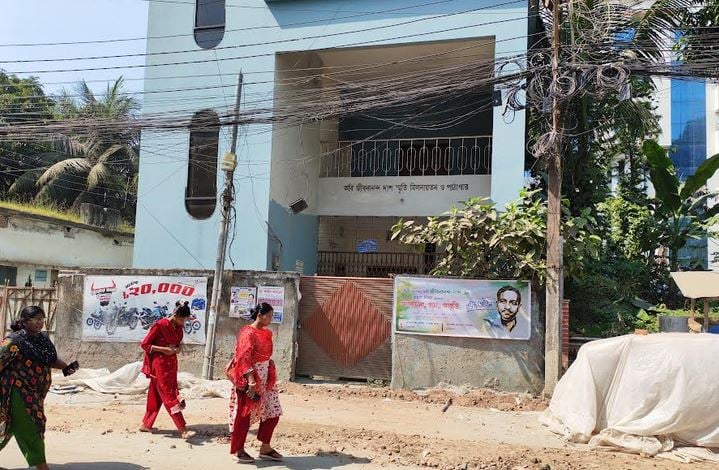News Flash

By Mofazzal Hossain
BARISHAL, Oct 23, 2025 (BSS) - The house that holds the memories of the “Ruposhi Banglar Kobi” (Poet of Beautiful Bengal) Jibanananda Das, still stands as a silent witness to time — neglected and forgotten. Every trace of the poet seems to bear the same melancholy that marked his life and works.
Writers, poets, and cultural activists in Barishal have long demanded that the house be taken under the Ministry of Cultural Affairs and preserved through the Department of Archaeology.
There have been movements, human chains, and public gatherings. Eventually, the “Jibanananda Das Library and Auditorium” was established after his name. But today, its doors remain locked — bookshelves are covered in dust, and silence fills the airless rooms.
Yesterday (October 22) marked the 71st death anniversary of poet Jibanananda Das. On this occasion, conversations were held with poets, artists, writers, organizers, and researchers of Barishal town.
All of them demanded that, along with preserving the residence of one of the greatest modern Bengali poets of the 20th century, the house should be renovated and turned into a gathering place for cultural personalities.
Talking to BSS, Apurba Gautam, Executive Member of the Central Committee of Barishal’s Pragati Lekhok Sangha said, “Though the Jibanananda Library was established after much effort, it now remains locked! Dust covers the bookshelves and silence engulfs the stage of the auditorium. The lights and fans are off; the air smells damp and forgotten — as if no one exists here anymore.”
Nusrat, a student of the Bangla Department at Barishal Government BM College, said, “The poet may no longer be with us, but his poems and essays still take us back to his time. He will live forever in every soul as the “Poet of Ruposhi Bangla.”
Visiting the site on Bogura Road where Jibanananda Das once lived, one now finds a government warehouse, tube well, and brick buildings. The poet’s dream home, his solitary veranda, the green tombs area— all are now confined to the pages of history.
Still, the wind seems to carry his immortal words, “Abar Ashibo Phire Dhanshiritir Tire, Ei Banglay…” (“I shall return again to the banks of the Dhanshiri, in this Bengal…”).
The house bearing the poet’s memory now serves as a locked library. A portrait of Jibanananda Das hangs on its main door. Barishal’s poets and cultural activists placed floral wreaths there on his death anniversary and organized a discussion meeting and cultural program.
They demanded that the poet’s house be renovated and transformed into a cultural hub for Barishal’s literary and artistic community — a place from which his spirit could continue to inspire generations.
Poet Asma Chowdhury, who came to pay tribute said, “Writers and poets from home and abroad visit Barishal willing to see Jibanananda’s house, but we have nothing to show them. The library is closed, the auditorium is covered in dust — it’s a matter of shame for us. Whatever has been done after his name exists only on paper; in reality, the place is almost abandoned.”
According to researchers on Jibanananda’s life and works, until he moved to Kolkata in 1946, his permanent residence was “Sarbananda Bhaban” on Bogura Road in Barishal city — his dream home. The road stretching from Bogura Road through Shitlakhola to Govt. Brojomohon College (BM College) once passed right by the house, named after his grandfather, Sarbananda Das, who worked at the Barishal Collectorate.
Later, Bogura Road was renamed “Jibanananda Sarak” (Jibanananda Road), though locals still call it by its old name.
Poet and Jibanananda Das researcher Henry Swapon explained that before the Das family purchased the house, they lived there as tenants— opposite the home of nationalist leader and philanthropist Ashwini Kumar Dutta. It was here, on February 17, 1899, that Jibanananda Das was born, though the exact location has now been lost to urbanization.
Swapon described the old Sarbananda Bhaban as a lively joint-family home surrounded by lush greenery — coconut, betel nut, mango, jackfruit, black plum, and pineapple trees encircled a medium-sized pond behind the house.
Today, the property is gone. The original Bhaban has been divided into three parts: on the left stands the Department of Public Health Engineering’s deep tube well; on the right, its warehouse and staff quarters; and in the middle, a residential building.
The spot where the main house once stood now contains a building named “Dhanshiri”. Because of the frequent use of “Dhanshiri” in Jibanananda Das’s poetry, many believe this to be his original home.
Part of the house once contained small family tombs— a long concrete platform marking ancestral graves, surrounded by a flower garden.
During his lifetime, Jibanananda Das spent quiet, contemplative hours there. Behind the tombs stood his modest room — with bamboo fencing on low walls and a thatched roof of palm leaves. It contained a bedroom, a small bathing space, and verandas on two sides. It was in the large veranda where the poet often paced silently, lost in thought.
Subhash Chandra Das, lawyer and organizer of Charukala Barishal, said, “In July 1946, Jibanananda Das went to Kolkata on leave from BM College and never returned. After Partition, his family also moved to Kolkata.
In 1955, a power of attorney deed was completed there — it bears his name but not his signature, as he had already passed away.
Through that deed, the house was purchased in 1969 by Abdul Razzak, an employee of the Barishal Collectorate.
According to his daughter, Mahila Parishad leader Nurjahan Begum, their family renamed the house ‘Dhanshiri’. The land was later acquired in 1958–59 by the government, and later the Public Health Engineering Department built a colony, warehouse, and water pump there.”
When asked about the government’s initiatives to preserve the poet’s home, Barishal Deputy Commissioner Ahsan Habib said: “The Divisional Commissioner of Barishal has already taken the initiative to renovate the house associated with the memory of Jibanananda Das. We are working on its restoration and preservation.
Its overall protection will be ensured.”